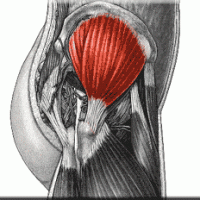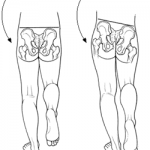Glute medius is one of the three gluteus muscles. Its actions include abduction of the hip (bringing the leg away from the midline) and external rotation of the thigh. But it also plays a very important role in pelvic stability.
Whenever we have all of our weight on one foot, our glute medius contacts to make sure the pelvis stays stable. If glute medius is not working properly, the pelvis becomes unstable. The body will then compensate which can cause a range of muscle imbalances, which leads to dysfunction and pain.
Pelvic instability causes an increase in pressure at both the hip and the knee joint, this is repeated for every single step taken throughout the day. With an unstable pelvis there is a drop in the hip, this hip drop can have a knock on effect at the knee joint by causing a valgus force at the knee (the knee caves inwards). The pressure at these joints is increased further during running or jumping.
The body will often compensate for a weakness in glute medius by overworking the back muscles or hamstrings. These dysfunctions need to be corrected before glute medius can be properly strengthened.
A weakness or inhibition in glute medius can be the primary concern or may be secondary to another injury. Here at Archview Clinic our therapists will assess you to find the root cause of your pain, then work with you to treat and rehabilitate the body. We use a combination of manual therapies, dry needling, exercise rehabilitation, postural training and Pilates. Our aim is for you to achieve full function and to prevent the injury from reoccurring.





